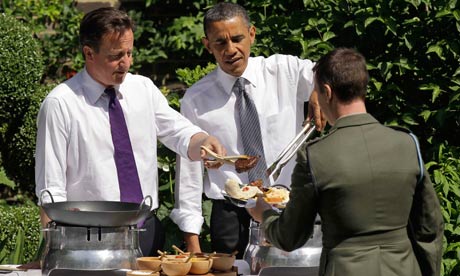
It seems that quite a lot of people thought the prime minister's barbecue for servicemen and women at No 10 an awful 1950s throwback. How horrifying, they said, that while Dave and his new best friend Barack dished out the meat, their wives, Sam and Michelle, were only on salad duty. Why should the female of the species be limited to faffing with cucumbers when the male is allowed to get down with the charcoal and tongs?
I was moderately taken aback by this indignation, and not only because I'd assumed everyone knew by now that, just as real men are allowed to eat quiche, so salads can be as punchy as Muhammad Ali. If I'm honest, there is a weird, unreconstructed part of me that secretly likes it when a man decides the moment has come for him to take over: to grill the meat you have spent three days tenderly marinating, to carve the bird you have just taken, brow pouring with sweat, out of the oven. It's a nostalgic thing, a hangover from childhood, that distant land where the carving was always done, with varying degrees of expertise, by a man: my grandpa, my dad, my stepfather. On Test Match Special the other day I heard Phil Tufnell admit to Henry Blofeld that he was an excellent carver, and I felt, just for a few moments, that all was right in the world. I know. So go on and hate me.
Still, what is it with men and meat? We live in the age of cheap supermarket chicken, Big Macs and all-you-can-eat carveries, and yet they persist in feeling that wrangling with a hunk of it enhances their status. Why? Does some ancestral memory lurk deep in their genes? It's possible. In The Rituals of Dinner (1992), her brilliant and now classic book about table manners, Margaret Visser points out that in the modern ceremony of the barbecue, there remains an echo of the ancient ritual of the impromptu meal at the scene of the hunt: barbies begin with a little male-dominated fire-making, just as early huntsmen lightened their load by butchering and eating a little of their kill before they set off for home.
Visser has a ravishing section on carving, a status-heavy business down the ages (some etymologists believe the word hierarchy, from the Greek for "rule over sacred things", came from the priestly superintendence over animal sacrifices in ancient times). According to Visser, a manual for carvers by a certain Vincenzo Cervio (1581) is one of the earliest specific and detailed instruction books we possess in any field – and when I say detailed, I mean it: the author takes 4,000 words to explain how to carve six platefuls of peacock. According to Cervio, no carver worthy of the name cut up meat on a dish. He lifted the entire joint or fowl up into the air, speared on a carving fork, and sliced pieces off it so that they fell on the plate below in perfectly organised patterns. Spearing the animal was especially important. Intense shame would follow if it fell from the fork in front of the assembled company.
For a time, no European noble's education was complete until he had learned to carve. But then in the early 19th century, virtuoso carving began its long decline. Roast meat was dismantled not at the table but in the kitchen. Only in Britain did the ritual persist. "We can hardly imagine," says Mrs Beeton, "an object of greater envy than is presented by a respected, portly paterfamilias carving..." Ha. Dear old Mrs B – though I cannot agree with her that a lady should never be given a bird's leg, legs being too obviously corporal. I've never really seen the point of breast, and I will eat any grisly bit going: skin, wings, parson's nose. When people ask me, oh-so-timidly, for "Only white meat, please", something inside me dies. Why eat meat at all if bones and tendons make you blanch? Though T, of course, does not eat dark meat, and I have learned to live with this. In fact, practically speaking, our tastes match perfectly, me liking all the bits he disdains and vice versa – and, now I think about it, perhaps the feminist in me should be glad. He does not gnaw bones, and he does not carve, either. If the people who took exception to Dave and Sam's little gathering have any point at all, then I am surely living in a thoroughly modern and egalitarian household. I should probably celebrate, possibly with a very expensive rib of aged beef. It's odd, isn't it? All of sudden slaving over a hot grill is the new feminism. To adapt the anthem: I am woman, hear me sharpen my blade.

